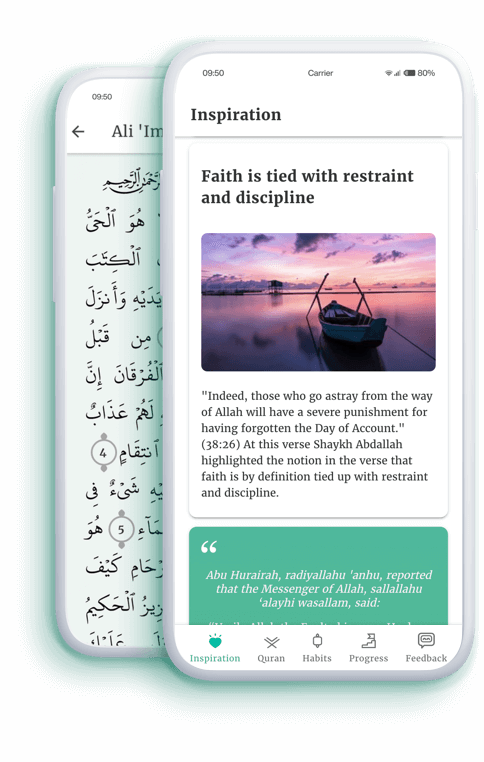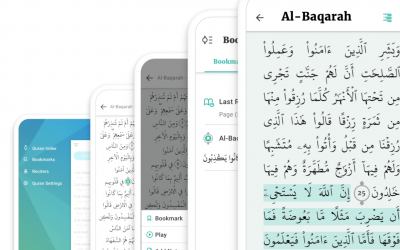Daily Quranic Inspiration
The Mercy of Allah
Could we ever doubt that the One who protects our clothes from getting too wet in this life will spare us from getting singed by fire in the next if we are sincere?
Don’t get stuck on the stumbling block
In a world where we’ve been given the Divine instruction to ‘Work!’, ‘Make effort!’ and ‘Try again!’, failing didn’t seem so scary but merely just part of the journey.
The one who asks
Give to those who ask of you, those who humble themselves and come to you for help.
Dear Wayfarer
You cannot govern people’s hearts or decisions any more than you can move a mountain.
Lessons In Tawakkul
We wreak havoc within ourselves—we lose sleep, we lose appetite, we become grieved and depressed. Not stopping our self-pity even once to realise that ALL we need to do to pass this test and get out that door is to loosen our grip (the internal grip) and let Allāh do what is in our best interest.
Ar-Rabb Al-Muʾmin
When Allāh knows that a person is sincere and dedicated in an act of worship, He facilitates it for them. When Allāh loves an act of worship from someone, He keeps them steadfast on it. He gives them the means and the support to remain persistent upon it.
What is in your heart?
To teach us, to purify us, to raise our ranks and for many other reasons that our minds cannot fathom, Allāh ﷻ sends us tests that often shock us. Allāh tests us to see how we think, how we react, how we behave and how we interact with what is happening.
Taming The Nafs
One concern that often crops up in the lives of those who want to achieve but cannot because of an inability to translate their desires and motivation into action is, how does one get out of this rut?
Means of Steadfastness Standing Firm in Islaam
Source: An extract from the booklet by Sheikh Muhammad Saleh Al-Munajjid Studying the stories of the prophets, may Allaah exalt their mention, and...
Authority of the Quran
Question I am taking a course on Religions of the World and I am having trouble locating the following answer:What is the nature of the authority of...
Is the reward less if someone reads Qur’an from a mobile phone or recites from memory?
Question Is the reward less if I read Qur’an from a mobile phone or recite from memory, and do not read Qur’an from the Mus-haf? Answer Praise be to...
Reasons for doing the prostration of forgetfulness
The prostration of forgetfulness in prayer is generally prescribed for three reasons:
1. Doing something extra: for example, doing an extra bow (rukoo’), prostration (sujood), standing or sitting.
2. Omitting something: such as omitting an essential part of the prayer, or omitting one of the obligatory parts of the prayer.
3. Being uncertain: such as when a person is not sure how many rak’ahs he has prayed, whether it was three or four, for example.
The problem of forgetting Qur’aan
“And We have indeed made the Qur’ân easy to understand and remember’ [al-Najm 54:17]
So whoever strives to memorize it and recite it regularly, it will be made easy for him, and whoever turns away from it, will lose it.
This is what encourages us to constantly review what we have memorized and to keep on reciting it, lest we forget it. The Prophet SAWS (peace and blessings of Alalah be upon him) gave this example because it is the best way to explain what he meant. He also confirmed it with his oath ‘by the One in Whose hand is the soul of Muhammad’, to affirm the importance of constantly reciting the Qur’aan and reviewing what one has learned.
Listening to Music and Quran
You have to beware of everything that could cause your balance of good deeds to be lighter, such as sins and evil deeds, because Allah is stern in punishment of those who disobey Him and transgress His sacred limits. So hasten to repent sincerely and ask Allah to help you in that.
The character of the Prophet (peace and blessings of Allaah be upon him) is the Qur’aan
It is proven that ‘Aa’ishah (may Allaah be pleased with her) said that when describing the Prophet (peace and blessings of Allaah be upon him). It is mentioned in the lengthy story about Sa’d ibn Hishaam ibn ‘Aamir, when he came to Madeenah and went to ‘Aa’ishah (may Allaah be pleased with her) and asked her about some matters. He said: I said: O Mother of the believers, tell me about the character of the Messenger of Allaah (S). She said: Do you not read the Qur’aan? I said: Of course. She said: The character of the Prophet of Allaah (S) was the Qur’aan. I wanted to get up and not ask about anything else until I died… Narrated by Muslim (746).
Ruling on leaving the Mushaf open when one has finished reading from it 194567
There is nothing wrong with leaving the Mushaf open if you want to come back to read from it, unless that will lead to it being treated in a disrespectful manner or getting dirt or dust or the like on it. In that case it should be closed so as to protect it. However it is better to close the Mushaf when you have finished reading from it, so as to protect it from dust and the like. If there is no reason to leave it open, then closing it is undoubtedly better.
Is it better to recite Qur’aan from memory or to read from the Mus-haf?
In prayer, it is better to recite from memory. Outside of prayer, it is better for a person to do that which will increase his khushoo’ (humility, focus). If his khushoo’ will be increased by reciting from memory, then that is better; if his khushoo’ will be increased by reading from the Mushaf, then that is better. If it is the same in either case, then reading from the Mushaf is better, because it combines reading and looking, and his eyes will be protected from looking at things that may distract him from reciting and pondering the meaning.
Is purity essential for reading Qur’aan from one’s mobile phone?
These mobile phones in which Qur’aan is put in written or recorded form do not come under the same ruling as the Mushaf, so it is permissible to touch them without having purified oneself and it is permissible to take them into the washroom with one, because writing Qur’aan on the mobile phone is not like writing it in a Mushaf. It takes the form of waves that appear and disappear, and its letters are not fixed, and the mobile phone may contain Qur’aan and other things.
Reading from the Mus-haf during an obligatory prayer
There is nothing wrong with reading Qur’aan from the Mushaf during a naafil prayer, such as qiyaam al-layl.
But in the case of obligatory prayers, it is makrooh to do that, because in most cases there is no need for it. But if there is a need, then there is nothing wrong with reading from the Mushaf in that case.
It is permissible for each partner to read Qur’aan next to the other
It is permissible for a wife to read Qur’aan next to her husband and vice versa.
Subscribe for Email Updates
Add your email to receive daily Quranic inspiration in your mailbox. All content from the Quran Journey app.












